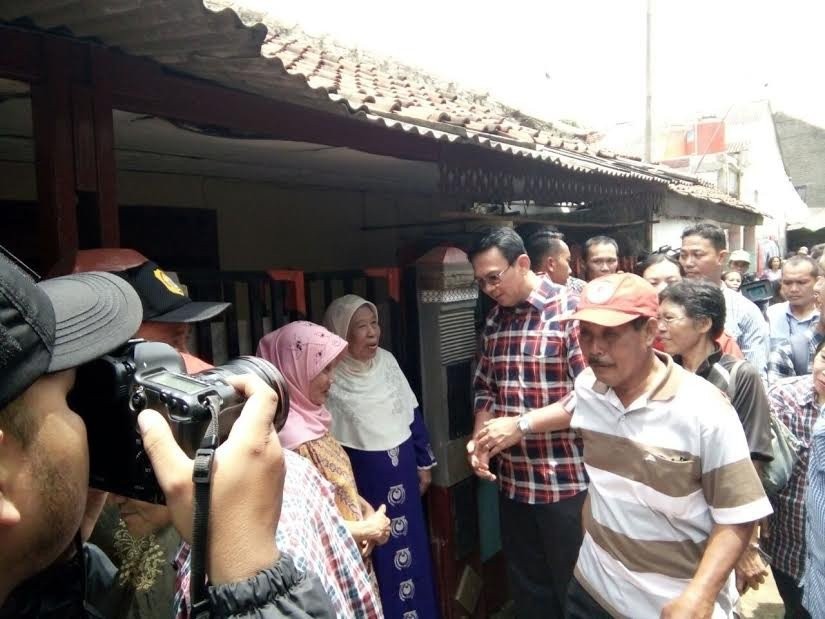Popular Reads
Top Results
Can't find what you're looking for?
View all search resultsPopular Reads
Top Results
Can't find what you're looking for?
View all search resultsAhok turns passive as rivals become more aggressive
Change text size
Gift Premium Articles
to Anyone
A
series of rejections by locals have prompted incumbent gubernatorial candidate Basuki “Ahok” Tjahaja Purnama to change his campaign style. On Monday, Ahok’s campaign team launched a center where the governor will be available to receive residents who wish to lodge reports and complaints about city-related matters.
The center, called Rumah Lembang, is located on Jl. Lembang, Menteng, Central Jakarta. Immediately after its inauguration, Rumah Lembang received dozens of Jakartans who arrived to see Ahok and convey their support for the beleaguered governor. They reported problems related to land ownership, potable water, road infrastructure and traffic.
Ahok promised to follow up on the complaints via Qlue, a mobile app through which users can file reports on problems in the city.
“We will pass it on to Qlue, just like how other people process their public complaints. Some people said they wanted to file a complaint but didn’t know how to use Qlue,” he said on the sidelines of the launch of Rumah Lembang.
Several people took the opportunity to have a picture taken with Ahok. Others conveyed support for the governor, who is facing legal pressure over alleged blasphemy.
“I don’t agree that Bapak [Ahok] should drop out of the race. You have to promise me that you will keep moving forward whatever the situation,” said Afni, a resident of Sunter, North Jakarta.
Ahok said he would continue to carry out blusukan (impromptu visits) during the campaign period.
“We’re aware that people who have expelled us and put up banners rejecting [our presence] are actually not residents of areas where they have staged protests,” Ahok said.
During a campaign stop in Rawa Belong, West Jakarta, on Nov. 2, Ahok was rushed to safety by security personnel after people protested his presence and accused him of committing blasphemy.
A week later, Ahok had to cancel a visit to Kedoya, West Jakarta, after a group of people claiming to be local residents rejected his presence for the same reason.
Candidate Agus Harimurti, meanwhile, has promised to give Rp 1 billion (US$74,489) to each community unit (RW) every year. “Let me repeat this once again, Rp 1 billion per year. Rp 1 billion,” Agus said to the thunderous applause of hundreds of people who attended his campaign event in Gelanggang Remaja, North Jakarta, on Sunday evening.
A similar program was also launched by then Jakarta governor Fauzi Bowo in 2008 known as the Subdistrict Resident Empowerment Program (PPMK). However, at the time the program’s effectiveness was questionable because although it was designated to assist micro businesses, many of the poor families used the money to cover daily and educational expenses.
Former minister and gubernatorial candidate Anies Baswedan, meanwhile, opted to visits residents of Jembatan Lima subdistrict in Tambora, West Jakarta, on Monday. The area often makes headlines for the many fires that break out there.
Anies went to a house of an elderly person who suffered burn wounds in a fire earlier this month.
“Please be patient, God would not test you beyond your limits,” he said.
Separately, an Indonesian Institute of Science (LIPI) political analyst, Siti Zuhro, said separately that Ahok and running mate Djarot Saiful Hidayat had no choice but to receive supporters at the center because a number of residents had collectively rejected them.
“They have no other choice than to be passive like that as I doubt that hundreds of barricades could be erected to protect them during the campaign period.” She told The Jakarta Post on Monday.
She added that several things could be learned from this case.
First was that public rejection should not be underestimated. “Public rejection is a reflection of their distaste. By rejecting Ahok and Djarot, the public is indirectly saying ‘We don’t choose you,’” she said.
Second was that “Indonesian people do not like arrogant and ostentatious leaders.” (caw/vny)










